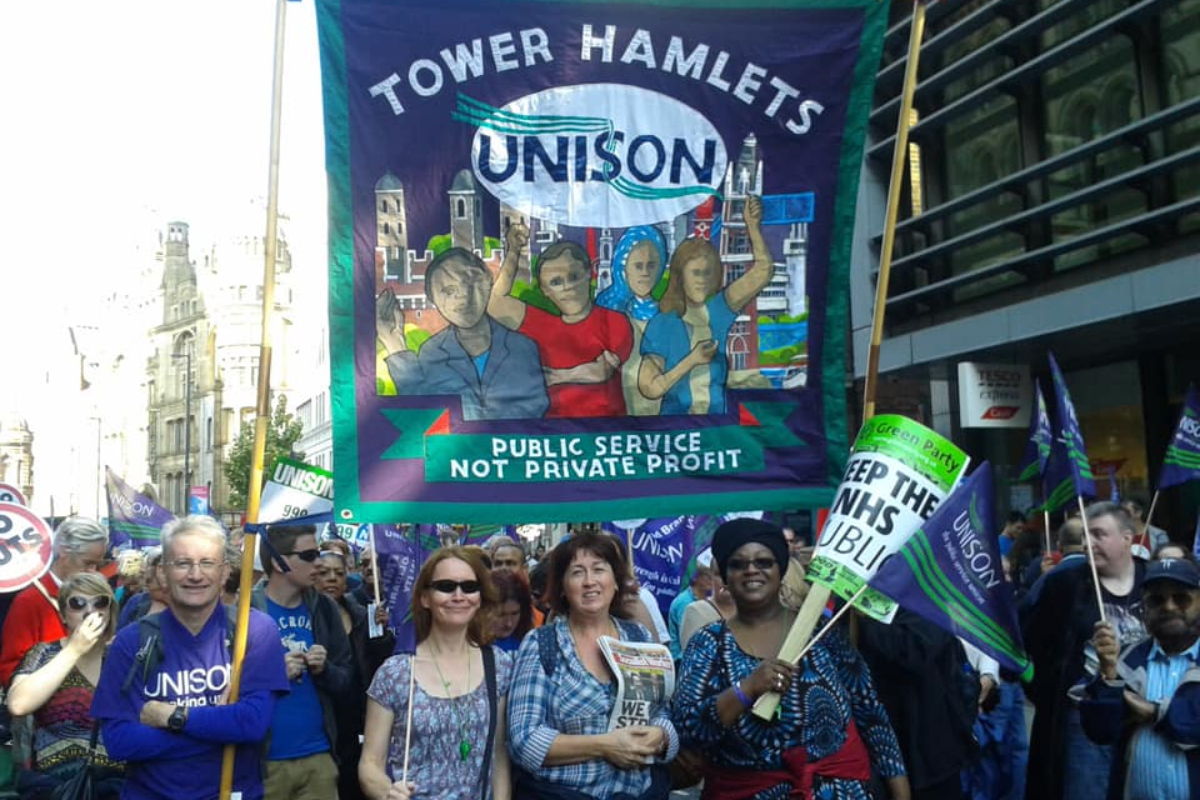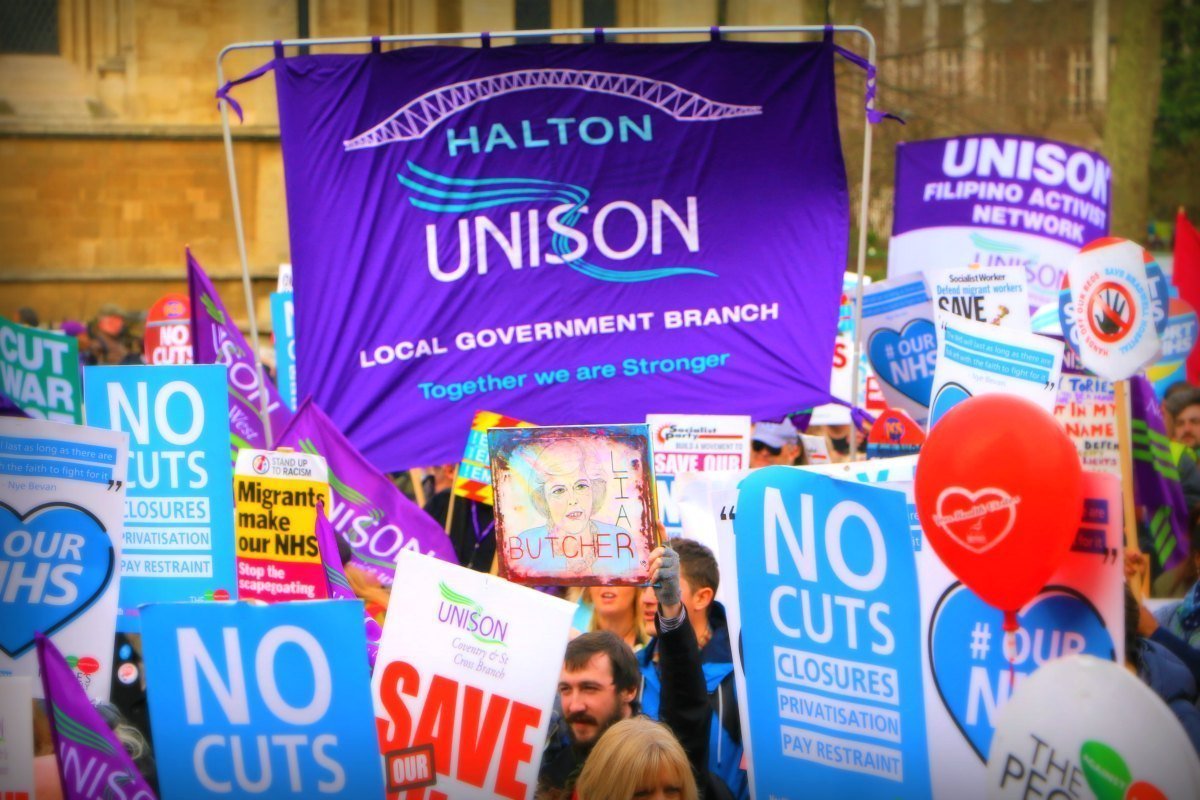Workers in local government are currently fighting a battle over pay. Similar struggles are erupting across the public sector, in response to the latest wave of Tory austerity. The trade unions must fight back with united and militant action.
Recently, the three largest unions in the country – Unison, Unite, and GMB – submitted a pay claim for a 10% wage increase for council and school support workers. This comes in the wake of over a decade of austerity and swingeing cuts to local government, which have seen workers’ real wages go down by 25%.
Today we are in the midst of an even deeper crisis than the 2008 crash, which ushered in this austerity. Unsurprisingly, the remedy offered by the ruling class is the same, with Rishi Sunak and the Tories promising a public sector pay freeze.
These attacks also come on top of a major crisis in local government. Croydon council was recently forced to declare bankruptcy, whilst Tower Hamlets council has attempted to ‘fire and rehire’ its workers, forcing them onto worse contracts in order to save money.
Plenty of Labour MPs tweeting #StopFireAndRehire about GMB members voting to reject Centrica’s proposals, but only a handful did when the Labour council London Borough of Tower Hamlets used Fire and Rehire to impose new contracts on their workers
— troovus (@troovus) December 8, 2020
The actions of these councils is a harbinger of the tsunami of cuts that will soon sweep over the rest of the country.
In June last year, the Centre for Progressive Policy revealed that 8 out of 10 councils in England are in danger of going bankrupt.
It is also worth noting that these councils are in working-class areas with high levels of deprivation. Wealthy Tory boroughs are generally shielded from the worst of the cuts.
Workers squeezed
That the three largest unions in Britain – representing 1.4 million local government workers – have united to call for this pay rise is a positive sign.
In order for such a demand to be met, however, it will require far more than moral appeals from the trade union leaders.
For example, in an article released by Unison last December last year, union officials attempt to point out why the pay freeze isn’t ‘fair’ or good for the economy. But the truth of the matter is that, when it comes to workers’ wages, the bosses and Tories couldn’t care less about ‘fairness’, whether it be in the public sector or the private sector.
What they are primarily concerned with is securing and boosting their profits. And in order to do this, particularly in a period of capitalist crisis, they must squeeze workers harder and drive down pay and conditions.
Neither the bosses, nor their political representatives in the Tory government, can be convinced by ‘persuasive’ and ‘rational’ arguments. Instead, they must be forced into giving concessions.
Show of strength
 For too long, there has been a lack of fighting leadership. Instead of organising and mobilising members to take action, the trade union leaders have hid behind anti-trade union laws. Where the prospect of strikes has been raised, it has always been done so reluctantly, under pressure from below.
For too long, there has been a lack of fighting leadership. Instead of organising and mobilising members to take action, the trade union leaders have hid behind anti-trade union laws. Where the prospect of strikes has been raised, it has always been done so reluctantly, under pressure from below.
But the anger in society is only growing. The situation for workers is reaching breaking point. And thousands are joining unions, looking to fight back.
Demands must be backed up by a show of strength. The call for a 10% pay increase must therefore be accompanied by a mass unionisation drive in workplaces – with a campaign to recruit both new members and shop stewards.
This must be done as part of a wider mobilisation by the TUC for a one-day public sector strike, Teachers, lecturers, workers in higher education, nurses, NHS staff, and other public sector workers are all fighting battles over pay as well. These struggles must be brought together, with united and coordinated action.
A public sector wide strike would be a call to arms, emboldening workers to take further action, and would complement the effort to bring new members into the trade unions.
Political struggle
This battle shouldn’t be kept to the industrial front. A political campaign must also be waged, organising working-class communities and grassroots activists from across the labour movement to wage a coordinated struggle against the cuts.
This means trade union activists and Labour members linking together locally, and putting pressure on the Labour leadership to back a mass campaign against austerity.
This is especially important in places where the party holds power. It is a scandal that it is Labour councils in Croydon and Tower Hamlets that are carrying out cuts and attacking workers’ terms and conditions.
Thankfully, however, local Labour members and other trade unions have come out in support of strikes by local government workers in Tower Hamlets.
This solidarity must be replicated across the country, and forged into a nationwide movement to fight the cuts – taking inspiration from the Poplar rates rebellion of a century ago, and the struggle by Liverpool city council against Thatcher and the Tories.
Fighting leadership
Above all, this requires bold, militant leadership at the head of the labour movement.
Unison is currently holding elections for its NEC. We encourage Unison members to vote for the left-wing candidates standing on the #TimeForRealChange platform.
This is an opportunity to transform our unions. Only then can we take on the Tories and bosses, and win the wages we deserve.
It’s #TimeForRealChange in #UNISON and these candidates stand for that in the upcoming NEC elections. Please pin this message to your social media profile and help spread the word! #Paul4NEC #TheMembersCandidate pic.twitter.com/ONZASCKuVp
— Paul Holmes #Paul4NEC (@Paul4Nec) March 10, 2021






